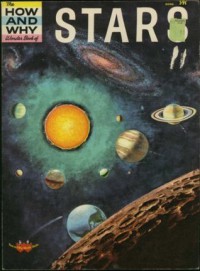Cosmology for Kids

Since I am now writing a review on a children's book suggests that I am back at my parents' house which means that I have access to my brother's collection that basically dates back to when we were kids. Actually, this book dates back even earlier, namely because Pluto is still a planet and the moon landing hadn't happened. In fact the book only goes as far as speculating what it would be like if we were to send humans onto the moon (and I don't believe Kennedy had made his famous 'let us send men to the moon' speech yet, which makes me wonder if George Bush Jnr was trying to emulate him when he made the speech about sending humans to Mars). Anyway, as the title suggests, this book is basically about everything beyond Earth's atmosphere, though it does make some mention of the atmosphere because the atmosphere does have an effect upon how we perceive the universe as a whole.
So, the book is structured in a way that we first explore the history of astronomy, and the book is good here as it doesn't rest on the belief that the Earth was flat until somebody decided to sail around the Earth to prove otherwise. In fact they point out that the Ancient Greeks had long known about that and simply pointed to how boats, when they disappear over the horizon, still have their sails visible. After this we then move onto the cosmological foundations, starting at the Earth and then moving out to the rest of the universe. Apparently there is also a star chart in this book but I believe we may have lost it long ago.
I could criticise this book on the fact that they don't say anything about Dark Matter, or raise the idea as to why, if the universe is infinite, the sky dark. Well, the two problems are that first of all this is a kid's book, and secondly some of those concepts may not have been fully developed yet (I'm not a huge expert on the subject of Dark Matter so I can't go into specific details, especially off the top of my head). Mind you, when I make the suggestion that the universe is infinite that is a bit of a misnomer because there is a theoretical edge, that being the 'Cosmic Background Radiation', though the thing is that they spot at which we have found it is not the spot at which it is currently located because when we look out into the cosmos we are basically looking at it as it appeared to be years, centuries, millenia, or even longer ago – what we are seeing when we hit the cosmic background radiation is the point of time beyond which the universe did not exist, and while it may not have existed then, it certainly exists now.
One thing that they did pick up, though didn't go into details on, is the idea of the redshift, that is that galaxies, and in fact stars, are forever moving away from each other suggesting that the universe is expanding. Mind you, this idea sort of makes my head hurt, especially when they talk about galaxies colliding with each other since if galaxies are forever moving away, how can they collide with each other? Even then, at the distances and times that it takes for things to move across the galaxy, let alone the universe, and the incredibly short span of time that makes up our lives, I wouldn't be too concerned about the consequences of two galaxies colliding.
Talking about cosmic things colliding we do have comets, though the writers seem to go to incredible lengths to assure the readers that nothing bad is going to happen. Well, according to Lucifer's Hammer if the Earth were to pass through the coma of a comet then some rather bad things would happen to us, namely that civilisation would probably come to an end. Mind you, they talked about the Earth passing through the comet's tail as opposed to the coma, which probably wouldn't do anything as much, with the exception of some impressive light displays in the upper atmosphere. However, with the concept that ancient peoples freaked out when a comet appeared in the sky it makes me wonder if some time, in the distant past, there was such an event, the memory of which has been passed down through generations.
 1
1


